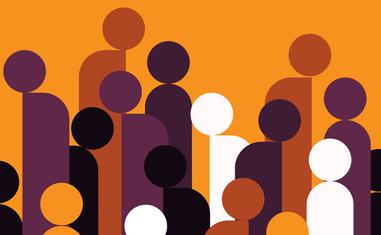The views expressed in our content reflect individual perspectives and do not represent the authoritative views of the Baha'i Faith.
Every person is born with talents and abilities. The notion that societal progress depends on these capacities being cultivated and directed toward constructive ends is well accepted.
In practice, however, many populations are viewed in a very different light and treated accordingly — for example, as victims in need of services or as problems in want of resolution. Such assumptions can obscure capacity, disempower communities, and reinforce counterproductive patterns of dependency.
RELATED: Exploring the Future of Work
To affirm that capacity is inherent in all is not to deny a host of very real challenges. Many capacities are latent and must be developed through appropriate training and education. Structural obstacles and biases must be removed. Practical opportunities must also be created for large numbers to contribute their share to the development of society.
The role to be played by the state, as steward and guardian of the common good, is vital in this regard.
Economic and political tools such as tax policy, permitting requirements, labor standards, and other legal structures will need to be organized around the overarching aim of developing and drawing on the capacities inherent in populations — and not simply providing services, necessary as that can be. Put simply, state action should focus on fostering and releasing the capacity of individuals and communities to contribute to the advancement of society.
Different types of support and reforms will be needed to facilitate the productive engagement — whether remunerated or not — of different groups or people in specific life circumstances. For society to benefit from the full contributions of women, for example, social institutions will need to honor and facilitate the provision of care by all members of society — not least by family leave policies and corporate and societal norms that embrace parenthood and child rearing among both fathers and mothers.
Volunteers wishing to offer a dedicated period of service to their community, such as youth completing studies or elders wanting to stay engaged after full-time employment, might be able to provide for themselves, but might also need a measure of assistance to be able to offer their services. Experience has shown that the personal development of individuals and the collective advance of society necessarily go hand in hand; each is linked with the other, and efforts to further one require that, sooner or later, attention be given to the other.
Government has a key role to play in fostering conditions that facilitate the expression of constructive agency, not least through efforts to create full and productive employment. At the same time, the release of capacity is a “horizontal” process as well as a “vertical” one. A person contributes to progress in part by assisting others to realize their own potential. Individuals empower other individuals; communities empower other communities. In this way, when such an orientation takes hold in an area, progress is increasingly approached as the outcome of joint interactions between government agencies, local communities, and individual actors, each concerned with both the quality of its own functioning and supporting the efficacy of the others.
RELATED: The Future of Work in a Spiritual World
Far from mere aspiration or speculation, this is a path the early stages of which Baha’i communities have begun to see unfold in diverse neighborhoods and villages around the world. It is a tangible movement whose features can be explored and whose dynamics can be advanced in virtually any context where those involved are committed to mutual support, universal participation, and advancement of the common good.
Approaching all as potential protagonists in the betterment of society is profoundly equalizing and morally empowering, in both principle and practice. To base action on the presumption that every individual and community is a reservoir of capacity and possibility for constructive transformation — regardless of wealth, education, social standing, or any other characteristic — is to reject the assumptions of superiority and inferiority that perpetuate countless inequalities.
Productive employment and decent work are central to the operation of society — in their direct outcomes of goods produced and services rendered, but also in the livelihoods they support and the role they play as a source of identity, purpose, and the development and expression of personal talents. The changing world of work offers a valuable opportunity to reconsider conceptions of progress and to organize economic structures in ways that are suited to contemporary needs. Let this be the task before us and let movement toward this vision increasingly draw on the capacities and contributions of the entire human family.

















Comments
Sign in or create an account
Continue with Facebookor